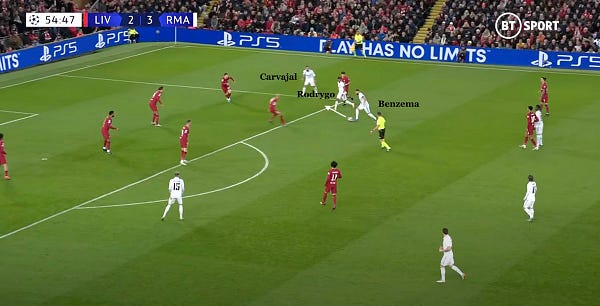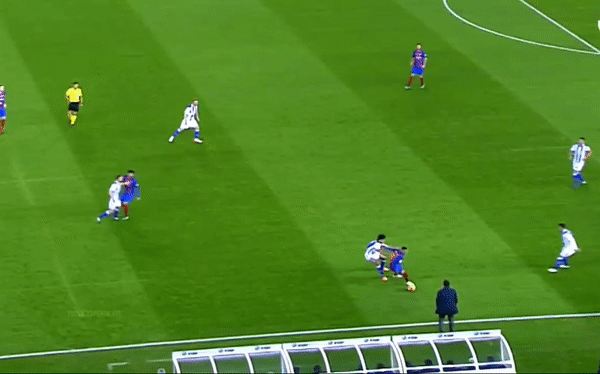The Streets: A player's cage.
The streets present some of the most difficult challenges for players, but they only serve to shape them into world-class, high-quality talent.
Everything I have achieved in football is due to playing football in the streets with my friends" Zinedine Zidane
One fine evening on campus I played some 5-a-side football with some friends. I had operated in a deep 8 role and thrived, carrying the ball and picking out passes. My team won the game comfortably, playing some lovely football.
The standout was a 5'8 batchmate. He had been playing barefoot, and he put on a sensational performance—clever flicks, neat dribbling, and smooth on the half-turn. He possessed qualities that non-professionals do not have. His understanding of the game and ability to get out of any jam was exceptional.
After the game, I asked him where he grew up playing, to which he said:
The streets.
And it made total sense.
The streets are an education in themselves. While coaching and modern infrastructure aim to fine-tune young talents to be the best versions of themselves, the streets ensure players are able to display the best of their talent, flair, and intelligence. They foster competitiveness and passion, which keeps players motivated to improve every day. The streets are filled with unpleasant circumstances: sharp stones and pebbles, small grounds, and large crowds, but these obstacles only serve to ensure that aspiring footballers remain determined to improve their game.
The streets are like an artist’s studio, a chef’s kitchen. There is no coach or referee to tell them what drills and training to do; they are their own teachers. They have the freedom to think creatively and come up with the best solutions to advance play and create opportunities. It's why most street footballers we see today operate in unconventional ways. They use the most unusual tricks to get around players- they have an incredible sense of deception with sharp body movements, feints, and technique.
Neymar Jr. is the epitome of a street footballer. His game is not only clever, but it also represents the joy and beauty of the game, which football fans can relate to. Backheel flicks, stepovers, and trivelas fire crowds, which energises stadiums and encourages their team to score and create. It focuses on the mental aspect of the game, which is crucial in tense situations.
Pelé, widely regarded as the greatest of all time, popularised the term 'joga bonito'-playing the beautiful game with freedom. During the 1958 World Cup, when Brazil was attempting to become a tactically-oriented team, Pelé brought back 'Ginga,' a form of art that encouraged creativity and individuality. A pillar of Brazilian football, Pelé recognised that removing Ginga from the team meant erasing Brazil's culture and history, which did not sit well with him. He went on to win the World Cup, putting on a spectacle. Scoring in the final at the tender age of 17 was a source of influence for the masses, who realised that anything could be achieved.
Ronaldinho won the hearts of many with his ‘joga bonito’. He was a creative dribbler with the mindset of a lion, representing an era in Barcelona that was unseen before. He always played with a smile on his face, reminding everyone that football is a game for entertainment. His body feints, stepovers, and no-look passes inspired fans all over the world, giving rise to young footballers who tried to model their game after him. It’s how the tradition, culture, and soul of football were kept alive.
That's why I never considered Antony's famous spin move to be a problem. While it never did much to advance the game, it did excite the crowd in unprecedented ways, who would cheer for their team to do even better. People often forget the psychological side of football, which is more important than ever.
This concept of 'The Streets' is also one of the reasons Brazil is such a strong footballing country, rich with history and legendary players. Their philosophy revolves around utilising individual strengths and flair. Football is also a means of escaping poverty in Brazil, increasing competitiveness among young children. The existence of futsal, where the pitch is smaller and the conditions are unfavourable, has resulted in the birth of extraordinary talent, hungry to win every duel and improve every minute.
Consider the recent French team, which was led by players with these profiles: Kylian Mbappé, Ousmane Dembélé, and Paul Pogba. They solved problems based on instinct, something that they picked up growing up. It's why they made two consecutive World Cup finals, one of which they won. The tactics were effective, but it was the development of true synergy, understanding, and talent that led to their success.
"I must admit that football in the streets gave us a great sense of
freedom and liberty." -Eric Cantona
There are many ways to play the game, and non-positional fundamentals are one of them. It’s why many appreciate Ancelotti, a man who understands profiles and dynamics and gives his players the right amount of freedom.
Last week, Real Madrid played Liverpool, and one of their goals came from a lovely connection between Benzema and Rodrygo- the play in tight spaces was a thing of beauty, built on chemistry. Real Madrid, in general, are littered with players who are able to stay calm under pressure and come up with answers to throw their opponents off balance.





Even the philosophy of 'Total Football', developed by Johan Cruyff, which focuses on positional play, relies heavily on technical ability and intelligence. It’s no secret that he too was a big propagator of street football.
Footballers from the street are more important than trained coaches.
-Johan Cruyff
Here’s an insightful video from Mahrez on why France produce more talent than England.
Simply put, England's style is 'too structured,' relying on physicality and athleticism rather than appreciating footballers' flair and skill. South London is home to ballers like Raheem Sterling and Jadon Sancho, who were taught to solve problems on their own, without any structure. And the imprints on their games are clear when they produce game-changing dribbles and mind-blowing strikes. Cage footballers have a strong mentality that keeps them grounded and resilient in the face of unfair criticism and vitriol.
Raheem Sterling is such an important figure in England for this very reason. He made a cultural impact by fighting against racial discrimination and doing the talking on the field. From the young boy from Brent to the talisman-like figure for Manchester City, he accepted any form of responsibility.
Bukayo Saka and Jadon Sancho, two players who faced racial abuse after missing penalties in the EURO final, have fought back and improved. Saka returned stronger, increasing his goal output and potentially leading Arsenal to a league title, while Sancho is gradually making his way into the United starting XI.
Marcus Rashford, who comes from a small background, has been through it all. Rashford, a victim of racial discrimination and harsh criticism, has bounced back several times and is currently in the best form of his career. Off the field, his actions speak louder than words as he feeds the poor and underprivileged children and uses social media to inform the masses about the problems that plague modern society. It is these types of characters that create a strong squad.
The World Cup wasn’t won (in 1966) on the playing fields of England. It was won on the streets" - Bobby Charlton
As a result, I believe England should do everything possible to give these types of players bigger roles- using the strengths of ‘cage ballers’, while also acknowledging the admirable and inspiring stories of these footballers- would go a long way in helping them develop as a footballing nation. Create a squad of players with natural talent and football intelligence, and England will only rise from there.
Let the artists paint, and the chefs cook.










Well written🙌